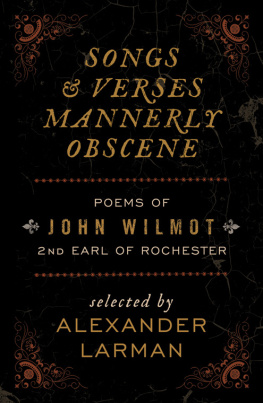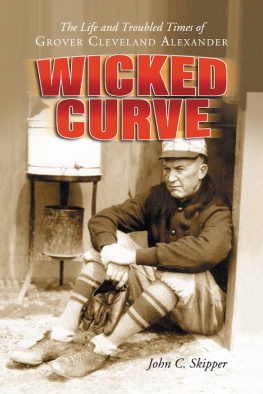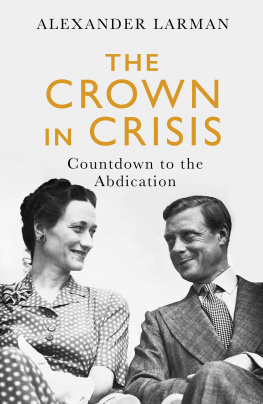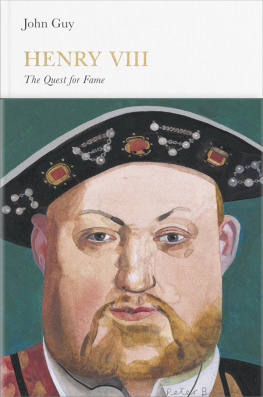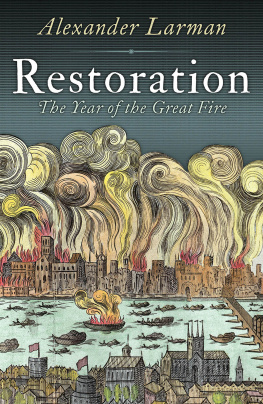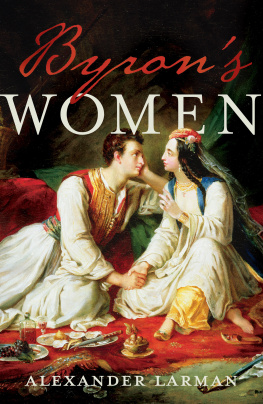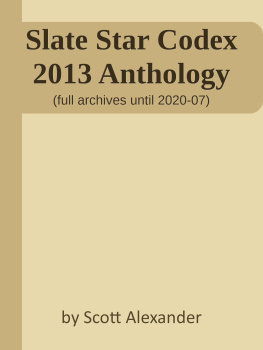Larman Alexander - Blazing star: the life and times of John Wilmot, Earl of Rochester
Here you can read online Larman Alexander - Blazing star: the life and times of John Wilmot, Earl of Rochester full text of the book (entire story) in english for free. Download pdf and epub, get meaning, cover and reviews about this ebook. City: Great Britain, year: 2014, publisher: Head of Zeus, genre: Non-fiction. Description of the work, (preface) as well as reviews are available. Best literature library LitArk.com created for fans of good reading and offers a wide selection of genres:
Romance novel
Science fiction
Adventure
Detective
Science
History
Home and family
Prose
Art
Politics
Computer
Non-fiction
Religion
Business
Children
Humor
Choose a favorite category and find really read worthwhile books. Enjoy immersion in the world of imagination, feel the emotions of the characters or learn something new for yourself, make an fascinating discovery.
- Book:Blazing star: the life and times of John Wilmot, Earl of Rochester
- Author:
- Publisher:Head of Zeus
- Genre:
- Year:2014
- City:Great Britain
- Rating:3 / 5
- Favourites:Add to favourites
- Your mark:
- 60
- 1
- 2
- 3
- 4
- 5
Blazing star: the life and times of John Wilmot, Earl of Rochester: summary, description and annotation
We offer to read an annotation, description, summary or preface (depends on what the author of the book "Blazing star: the life and times of John Wilmot, Earl of Rochester" wrote himself). If you haven't found the necessary information about the book — write in the comments, we will try to find it.
Blazing star: the life and times of John Wilmot, Earl of Rochester — read online for free the complete book (whole text) full work
Below is the text of the book, divided by pages. System saving the place of the last page read, allows you to conveniently read the book "Blazing star: the life and times of John Wilmot, Earl of Rochester" online for free, without having to search again every time where you left off. Put a bookmark, and you can go to the page where you finished reading at any time.
Font size:
Interval:
Bookmark:


www.headofzeus.com
For my father, who loved books
No glorious thing was ever made to stay
My Blazing-Star but visits, and away
L ORD R OCHESTER ,
A Very Heroical Epistle
in Answer to Ephelia
When the ill-fated film of Lord Rochesters life, The Libertine , first screened at the Toronto Film Festival in 2004, early word was not good. While there was no screaming on the non-existent social media by disappointed Johnny Depp fans desperate to vent their spleensomething along the lines, perhaps, of what is this cr8p who cares about sum dead poet lol where is capn jackwild rumours began to circulate that the powerful distributor, Harvey Weinstein, was shocked at the films apparently lurid and provocative content, which was said to include everything from necrophilia and graphically depicted orgies to a scene in which Rochester advances on a young page boy and declaims, in a poetic style unfortunately akin to that of Pam Ayres briefly possessed by the spirit of Jean Genet, Youve cut me down, I must confess/But in my mouth your balls must rest.
As usual, the rumours proved to be false. I discuss later on why The Libertine is both a disappointingly muddled account of Rochesters life and times and an artistic mishap on its own terms, but it is somewhat regrettable from an entertainment perspective that the film didnt go further in its sensationalistic and lurid mythologizing. An on-form Ken Russell in his 1970s heyday might have worked wonders with the short but spectacular life of John Wilmot, 2nd Earl of Rochester.
Indeed, Russells trademark bombast and flamboyance mightfor oncehave seemed almost sedate in comparison with what really happened in Rochesters thirty-three-year span on the planet between 1647 and 1680. John Wilmots adventures embraced tempestuous feuds with the great and good of the age (including the Poet Laureate, John Dryden); annual banishment from Charles IIs court for his outrageous behaviour; the abduction of his future wife and subsequent imprisonment in the Tower of London; posing as an Italian doctor (and his wife) for the purpose of defrauding the gullible; andof coursea very great deal of sex. When he wrote in a late poem that he had swived more whores more ways than Sodoms walls, it seemed less like a boast than a mere statement of fact. It was little wonder that he died, agonizingly, of syphilis.
As for his poetry, it was synonymous with the man, full of obscene humour, four-letter words and outrageous sexual detail, but displaying little obvious literary worth. Samuel Johnson huffed in a posthumous account of Rochesters life that he had blazed out his youth and his health in lavish voluptuousness and accepted wisdom for centuries has been that the wicked Wilmot was one of the most notorious and dastardly men who ever set foot upon the earth. His name has become a byword for licentiousness; when Russell Brand was first building his reputation as a louche bon vivant, comparisons with his Restoration predecessor were often made.
But there is also another Rochester, who has not received his due. This man was a heroic naval officer, who served his country with much credit in the Anglo-Dutch War. He was an Oxford graduate of enormous intellectual and artistic curiosity who spent his formative years on the continent where he encountered many of the leading thinkers of the day, before returning to the social upheaval of the Restoration court where, unusually for one of the periods fops on the make, he never lost the common touch, even as he walked with the king. He was a fond (if capricious) husband and lover, a loving father and a faithful and loyal friend to many. Many of the more violent and cruel antics ascribed to him were either falsely attributed, or simply never occurred. His poetry explored the preoccupations of the age with a mixture of witty sophistication and original thought, and some of his love lyrics are amongst the most beautiful of the time. Hazlitt called his writing the poetry of wit combined with the love of pleasure, praised his passionate enthusiasm and called his epigrams the truest that were ever written. Dying cruelly young, he deprived England, and English literature, of one of its brightest lights, but even as he lingered on his deathbed, a lifelong interest in religion came to his consciousness once more.
So there are two sides of Rochester, neatly encapsulated in his fictional representation as Dorimant in his friend George Ethereges The Man Of Mode , of whom it is said I know he is a devil, but he has something of the angel yet undefaced in him. It would be a misreading of his character to attempt either to dismiss Rochester as merely a diabolic rake, or to rehabilitate him as a decent and kindly man who has had a remarkably unfair posthumous reputation. What makes him such a fascinating figure, as both a man and a writer, is that the two sides of him were in constant opposition throughout his life, and remained so until his death. While this frustrates easy attempts at analysis, it makes for a fascinating and complex story.
Yet this book is more than just the story of John Wilmot. He stood at the centre of an era of social mobility the like of which England had never seen before. He was born at a time when every accepted idea, from hereditary monarchy to the role of Parliament, was being challenged, and where the resulting vacuum allowed first Cromwell and the Commonwealth and then Charles II to mould the country in their own image. As Rochesters fortunes and reputation rose, he found himself, a soldiers son, in a position where he became one of the leading men at court. It was an era where casual street violence was as likely to end your life as any plague or war, and where if you sold your body, you could prosper and rise to the top of court, just as easily as you might find yourself dead from disease before you reached adulthood. Everything was literally up for grabs.
The thirty-three years that Rochester lived were some of the most remarkable in the history of England. The age was rich in hard living and strong wine, but also in architectural innovation, literary achievement, philosophical investigation and scientific advance. It was a time of plague, and of fire. It was a time of uncertainty, as few knew whether this new age of libertine royalty would last, or whether it would be as short-lived as Cromwells rule had been. It was a time of carpe diem , and of rebirth. Rochester, and those around him, turned the accepted orthodoxies that had lasted for centuries before on their heads in a brief, bawdy, brilliant historical moment. With their thoughts, words and actions, the merry gang redefined society, for good or for ill, as the old certainties were swept away and a new world was explored, full of dangerous but thrilling contradictionsbetween piety and debauchery, obedience and free-thinking.
In this, as in many ways, he is a man who speaks to our own time as much as he did to his. Writing this while listening to the stultifying drone of Prime Ministers Questions in the background, I am reminded that we still need a man, or woman, who can stand up, expose the bland and cynical hypocrisies of politicians and self-appointed opinion-formers for what they are and refuse to place them-selves on a pedestal of virtue, and instead argue that it is by embracing our flaws, contradictions and baser desires that we are set free from the dull and oppressive orthodoxies of everyday life. If Rochester epitomizes anything, it is free thought, free speech and free lovefreedom, in fact, in all its forms.
Next pageFont size:
Interval:
Bookmark:
Similar books «Blazing star: the life and times of John Wilmot, Earl of Rochester»
Look at similar books to Blazing star: the life and times of John Wilmot, Earl of Rochester. We have selected literature similar in name and meaning in the hope of providing readers with more options to find new, interesting, not yet read works.
Discussion, reviews of the book Blazing star: the life and times of John Wilmot, Earl of Rochester and just readers' own opinions. Leave your comments, write what you think about the work, its meaning or the main characters. Specify what exactly you liked and what you didn't like, and why you think so.

